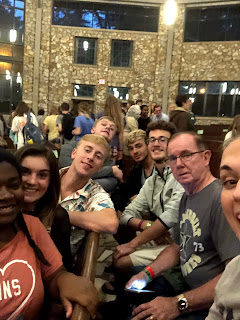 |
| 2019 Montreat Youth Conference |
 |
| 2020 Montreat Youth Conference |
Responding to God’s love and grace, we are a welcoming, faithful, and hopeful community, following Jesus and serving him in the world. - The Vision Statement of 2nd Presbyterian Church
 |
| 2019 Montreat Youth Conference |
 |
| 2020 Montreat Youth Conference |
As you are most likely aware, there has been a dramatic rise
in active Knox County Covid-19 cases in recent weeks, including an increase in
both hospitalizations and deaths. Currently, two of the five benchmarks for
reopening are red, two are green, and one is yellow. Therefore, out of an
abundance of caution and in an effort to do our part in not contributing to the
further spread of the novel coronavirus, the Session has taken the following
actions:
Worship
We will no longer resume in-person worship on August 2nd
and will continue to worship solely via streaming until further notice. We hope
to resume in-person worship after Labor Day, but will reevaluate at the August
18th Stated Session meeting.
Committees/Groups
Effective immediately all group meetings in the church
building will be cancelled for the remainder of July and the month of August.
Groups and committees of the church may continue to meet via technology or in
small groups away from the church building, but the church building itself will
be closed to all groups except the Preschool through the end of August. We will
reevaluate at the August 18th Stated Session meeting.
Church Office
The church staff will continue to work their normal hours at
the church building in order to coordinate and facilitate the ministry of the
congregation. The church office, however, will be closed except for deliveries,
contractors, and other necessary business.
We appreciate that this may cause frustration for some while
alleviating anxiety for others. We do not take this action lightly but we do
feel this is the best way to safeguard the health of our members, our staff,
and the community of Knoxville. Please stay home if you do not have to go out
and please remember the Five Core Principles for health: practice [physical
distancing; wear face coverings when in public and physical distancing cannot
be achieved; wash hand properly and often; clean surfaces regularly; stay home
when sick.
Whether or not that is the case, I know that I don't normally look people in the eyes when I talk to them because now that I can only look people in the eyes when I talk to them I have discovered that I am uncomfortable looking people in the eyes when I talk to them. It's so personal and...intimate. I feel like I am intruding in some sort of personal space to which I'm not sure I've been invited. Yes, I was taught like everyone else, "When you meet someone, shake their hand and look them in the eyes." And I have done that...when meeting them. But I think I haven't done that for the rest of the conversation. And now that the whole shaking hands things is gone the eyes are all we have and it makes me uncomfortable to look people in the eyes but I don't want to not look people in the eyes because there really is nowhere else to look. And I wonder what that says about me and my openness to others.
"The sunlight that brought light and healing to you, has brought stripes and death to me. This Fourth of July is yours, not mine."
"What, to the American slave, is your 4th of July? I answer; a day that reveals to him, more than all other days in the year, the gross injustice and cruelty to which he is the constant victim."
"Notwithstanding the dark picture I have this day presented, of the state of the nation, I do not despair of this country. There are forces in operation which must inevitably work the downfall of slavery. 'The arm of the Lord is not shortened,' and the doom of slavery is certain. I, therefore, leave off where I began, with hope."